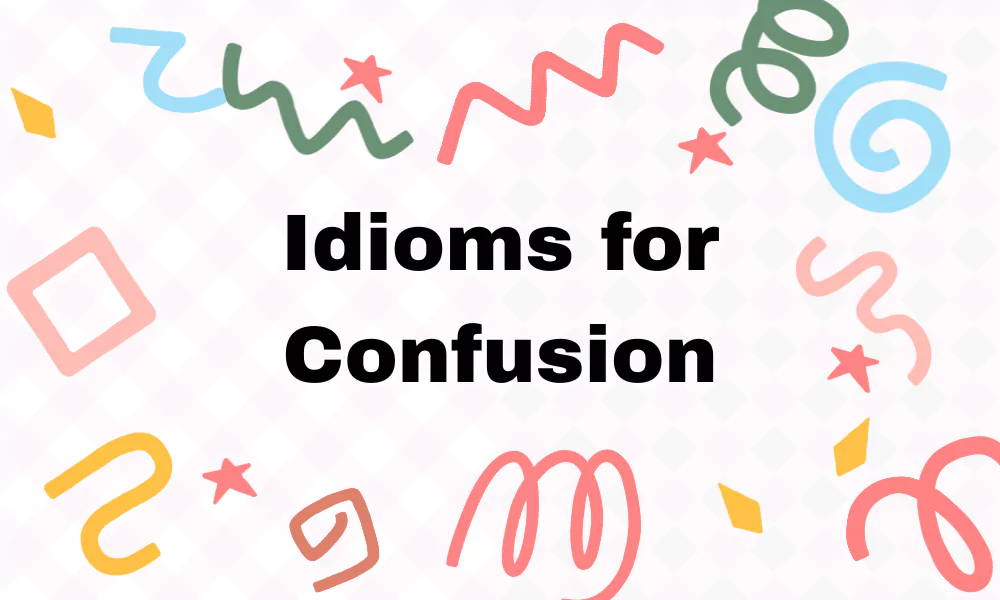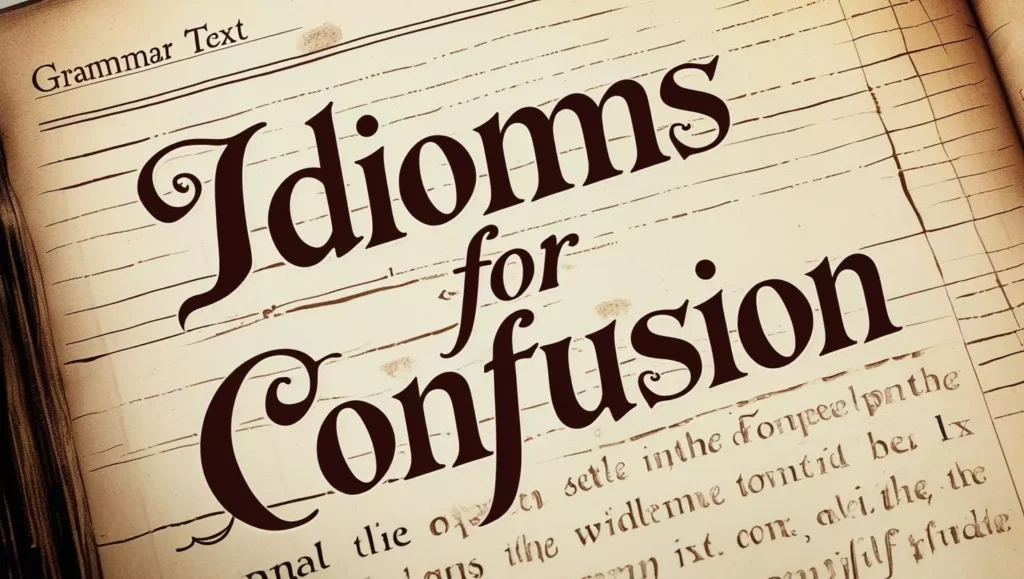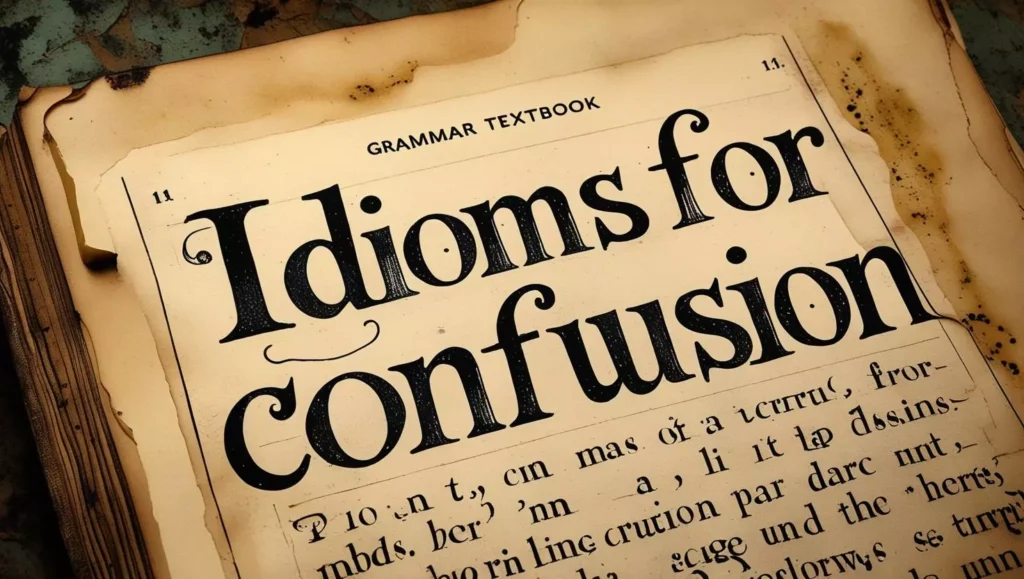Idioms for Confusion – Meanings, Origins, and Everyday Examples

Feeling puzzled, lost, or unsure? English has a clever way of capturing those moments through idioms for confusion. These expressions don’t always mean what they literally say, but they perfectly describe the mental fog we experience when things just don’t make sense.
From phrases that paint confusion as a maze to ones that compare it to a tangled mess, idioms add color and personality to everyday speech. In this guide, we’ll explore some of the most popular idioms for confusion, explain their meanings, and show you how to use them naturally in conversations.
What Are Idioms for Confusion?
Confusion idioms are everyday expressions used to describe moments when things feel unclear, puzzling, or difficult to understand. Instead of saying “I don’t understand,” people often use colorful phrases like “at sea” or “my head is spinning” to capture the feeling more vividly. These idioms don’t carry their literal meaning; rather, they use figurative language to paint a picture of mental uncertainty. Learning these expressions not only helps you sound more natural in English but also makes your conversations more engaging and expressive.

Commonly Used Idioms for Confusion
- It’s all Greek to me – Something that’s hard to understand.
Example: The physics lecture was all Greek to me. - At sea – Feeling lost or unsure.
Example: I was at sea during the new software training. - In the dark – Lacking information or understanding.
Example: I’m completely in the dark about his decision. - My head is spinning – Overwhelmed with too much information.
Example: After the meeting, my head was spinning with details. - Not have a clue – Totally unaware or confused.
Example: I don’t have a clue how this machine works. - Mixed up – Confused or disorganized.
Example: She’s mixed up about the meeting schedule. - Out of my depth – In a situation too difficult to handle.
Example: I felt out of my depth in the advanced coding class. - Lost in thought – So deep in thinking that one seems confused.
Example: He was lost in thought and didn’t hear me call. - At a loss – Unsure of what to say or do.
Example: I’m at a loss for words after hearing the news. - Baffled by – Completely confused.
Example: I was baffled by the sudden change in rules. - Up in the air – Uncertain or undecided.
Example: Our travel plans are still up in the air. - All over the place – Disorganized or scattered.
Example: His ideas were all over the place during the discussion. - In a haze – Mentally unclear.
Example: She walked around in a haze after the long flight. - Go blank – Unable to think of anything.
Example: I went blank during the exam. - In a fog – Mentally confused or dazed.
Example: After the surgery, I felt like I was in a fog. - Mind-boggling – Extremely confusing or overwhelming.
Example: The complexity of the problem was mind-boggling. - In two minds – Unable to decide.
Example: I’m in two minds about moving to another city. - Thrown off balance – Unexpectedly confused.
Example: His question threw me off balance. - Don’t know which way is up – Completely disoriented.
Example: After the accident, I didn’t know which way was up. - In a muddle – Disorganized or confused.
Example: I’m in a muddle with all these papers on my desk. - Puzzle over – Think hard but still confused.
Example: I puzzled over the math problem for hours. - Crossed wires – Misunderstanding in communication.
Example: We must have got our wires crossed about the meeting time. - Turned around – Confused about direction or situation.
Example: I got turned around in the new city. - Brain freeze – Temporary inability to think.
Example: I got a brain freeze while trying to explain the answer. - Draw a blank – Fail to remember or think of something.
Example: I drew a blank when they asked me his name. - Dazed and confused – Completely bewildered.
Example: She looked dazed and confused after the announcement. - Mind in knots – Overthinking or feeling tangled mentally.
Example: His explanation left my mind in knots. - Can’t make heads or tails of it – Cannot understand something.
Example: I can’t make heads or tails of this document. - Boggle the mind – Something very confusing or hard to grasp.
Example: The size of the universe boggles the mind. - Jumbled up – Mixed and confusing.
Example: His thoughts were all jumbled up. - Perplexed about – Unsure and confused.
Example: I was perplexed about her sudden silence. - Not add up – Doesn’t make sense.
Example: His story doesn’t add up. - Out of sorts – Not thinking clearly.
Example: He seemed out of sorts after the long journey. - Like a deer in headlights – Frozen in confusion or fear.
Example: He stood there like a deer in headlights when asked to speak. - Over my head – Too complex to understand.
Example: The technical jargon went over my head. - Chasing your tail – Wasting time in confusion without progress.
Example: I’ve been chasing my tail with this project all day. - In a daze – Bewildered or absent-minded.
Example: He was in a daze after hearing the shocking news. - All mixed together – Things are confused and unclear.
Example: My thoughts are all mixed together right now. - Lost the plot – Lost track or become confused.
Example: Halfway through the movie, I lost the plot. - Scratching your head – Trying to figure out something confusing.
Example: I was scratching my head over the strange results. - Disoriented – Not knowing where you are or what to do.
Example: After waking up suddenly, I felt disoriented. - Mind’s a blur – Things feel unclear.
Example: That day is just a blur in my mind. - In limbo – Stuck in uncertainty.
Example: Our plans are in limbo until we get approval. - Brain fog – A state of mental confusion.
Example: I had brain fog after staying up all night. - Talking in riddles – Speaking in a confusing way.
Example: Stop talking in riddles and explain clearly. - Lost in translation – Misunderstood due to poor explanation.
Example: The humor was lost in translation. - At sixes and sevens – In a state of disorder or confusion.
Example: The office was at sixes and sevens during the shift. - Don’t know where to turn – Unsure of what to do next.
Example: I didn’t know where to turn after losing my job. - Mind’s a jumble – Disorganized thoughts.
Example: My mind’s a jumble after that conversation. - Lost track – Forgot or became confused about something.
Example: I lost track of time while reading.
Rare and Unique Idioms for Confusion
- Like herding cats – Trying to control chaos.
Example: Getting them to agree was like herding cats. - Muddle-headed – Easily confused.
Example: He’s too muddle-headed to manage details. - In a pickle – In a confusing or tricky situation.
Example: I’m in a pickle with these mixed instructions. - Clouded judgment – Thinking unclearly.
Example: His anger clouded his judgment. - All at sea – Totally confused.
Example: She was all at sea during the debate. - Bewildered gaze – A confused look.
Example: He stared with a bewildered gaze at the puzzle. - Like a headless chicken – Acting in panic without direction.
Example: She was running around like a headless chicken. - Brain scrambled – Completely confused.
Example: My brain’s scrambled after those instructions. - Foggy memory – Unclear recollection.
Example: I only have a foggy memory of that event. - Lost compass – Without guidance, confused.
Example: Without my mentor, I feel like I’ve lost my compass. - Mind tangled – Overcomplicated thoughts.
Example: My mind is tangled in too many worries. - Scatterbrained – Disorganized and confused.
Example: She’s too scatterbrained to finish tasks on time. - In a tailspin – Emotionally or mentally confused.
Example: He went into a tailspin after hearing the news. - Like a dog chasing its tail – Repetitive, pointless confusion.
Example: The investigation was like a dog chasing its tail. - Head in the clouds – Not paying attention.
Example: He always has his head in the clouds in class. - Bewildered maze – A confusing situation.
Example: Navigating bureaucracy is a bewildered maze. - Confused as a goat on astroturf – Humorously confused.
Example: He looked as confused as a goat on astroturf. - Mind like spaghetti – Thoughts all tangled.
Example: My mind’s like spaghetti right now. - Choked up with confusion – Too confused to speak.
Example: I was choked up with confusion during the exam. - Like solving a Rubik’s cube blindfolded – Extremely confusing task.
Example: The paperwork was like solving a Rubik’s cube blindfolded.
Confusion Idioms in Literature and Pop Culture
- Through the looking glass – Entering a confusing, surreal world (Lewis Carroll).
Example: Negotiating the contract felt like going through the looking glass. - Down the rabbit hole – Entering a confusing or bizarre situation (Alice in Wonderland).
Example: Researching that topic took me down the rabbit hole. - Catch-22 – A no-win, confusing situation (Joseph Heller).
Example: Finding a job without experience is a Catch-22. - Curiosity killed the cat – Getting into trouble by being too curious.
Example: Don’t ask too many questions because curiosity killed the cat. - Lost in the shuffle – Forgotten or confused in chaos.
Example: His request got lost in the shuffle. - Through a glass darkly – Seeing things unclearly (Biblical/Literary).
Example: We see the future through a glass darkly. - Stranger than fiction – So odd it’s confusing.
Example: The real story was stranger than fiction. - Smoke and mirrors – Something that hides the truth.
Example: The explanation was just smoke and mirrors. - The Twilight Zone – A surreal, confusing situation (TV series).
Example: That town felt like stepping into The Twilight Zone. - Labyrinth of the mind – Complex confusion (classical literature).
Example: The plot was a labyrinth of the mind. - Much ado about nothing – Confusion over trivial matters (Shakespeare).
Example: Their argument was much ado about nothing. - Ships that pass in the night – Confusing, brief encounters (Longfellow).
Example: Our friendship ended like ships that pass in the night. - Through thick and thin – Confusing hardships (literary origin).
Example: We’ve stayed together through thick and thin. - Mad as a hatter – Acting confused or insane (Alice in Wonderland).
Example: His behavior was mad as a hatter. - Penny for your thoughts – Asking about confusion or silence.
Example: You look puzzled—a penny for your thoughts? - All the world’s a stage – Life’s confusing roles (Shakespeare).
Example: His speech felt like all the world’s a stage. - Lost world – A mysterious, confusing place (Conan Doyle).
Example: The jungle felt like a lost world. - Through fire and fury – Confusing hardship (literary use).
Example: He stood firm through fire and fury. - Cheshire cat smile – Mysterious or confusing grin (Alice in Wonderland).
Example: She gave a Cheshire cat smile when asked. - Pandora’s box – Opening a confusing and uncontrollable situation (Greek myth).
Example: Mentioning that issue opened Pandora’s box.

Tips for Using Confusion Idioms in Writing and Speech
Idioms add flavor to language, but using them correctly is key to sounding natural. Here are some practical tips to make the most of confusion idioms:
- Know the Context – Choose an idiom that fits the situation. For example, “I’m at sea” works in casual talk, but “Catch-22” fits better in formal discussions.
- Don’t Overuse Them – Idioms are powerful, but too many can overwhelm your reader or listener. Sprinkle them naturally instead of stacking them.
- Consider Your Audience – Not everyone is familiar with idioms. When writing for learners or international readers, pair the idiom with a brief explanation.
- Use Idioms for Emphasis – A well-placed idiom can highlight confusion more vividly than plain words. For instance, saying “My head is spinning” is more impactful than “I’m confused.”
- Match Tone and Style – Some idioms are humorous (“like a headless chicken”), while others are serious (“in a fog”). Pick the one that best suits your tone.
- Practice in Everyday Conversation – The more you use idioms, the more natural they’ll feel. Try slipping one into casual chats to build confidence.
Synonyms and Alternatives for Confusion
| Synonyms | Meanings |
|---|---|
| Bewilderment | A state of being completely puzzled or perplexed. |
| Perplexity | Inability to understand something clearly. |
| Uncertainty | Lack of clarity about what will happen or what something means. |
| Disorientation | A feeling of being lost or without clear direction. |
| Mystification | The act of being baffled or left without explanation. |
| Turmoil | A state of disorder and mental unrest. |
| Obscurity | Something unclear, hidden, or hard to understand. |
| Chaos | Total disorder and lack of clarity. |
| Unclarity | A lack of clear meaning or understanding. |
| Ambiguity | The presence of more than one possible meaning, leading to confusion. |
Read: GNG Meaning
Read: YNS Meaning
FAQs
Conclusion
Confusion is a part of everyday life, and idioms give us creative ways to express those moments when nothing seems clear. From “at sea” to “down the rabbit hole,” these phrases capture the feeling of being puzzled in ways plain words can’t. Learning idioms for confusion not only improves your English vocabulary but also makes your speech and writing more colorful, relatable, and engaging. Whether you’re a student, professional, or language enthusiast, using these idioms will help you communicate emotions and situations more effectively. So the next time you’re feeling lost, try using one of these idioms, you might just find the perfect way to say, “I’m confused!”
